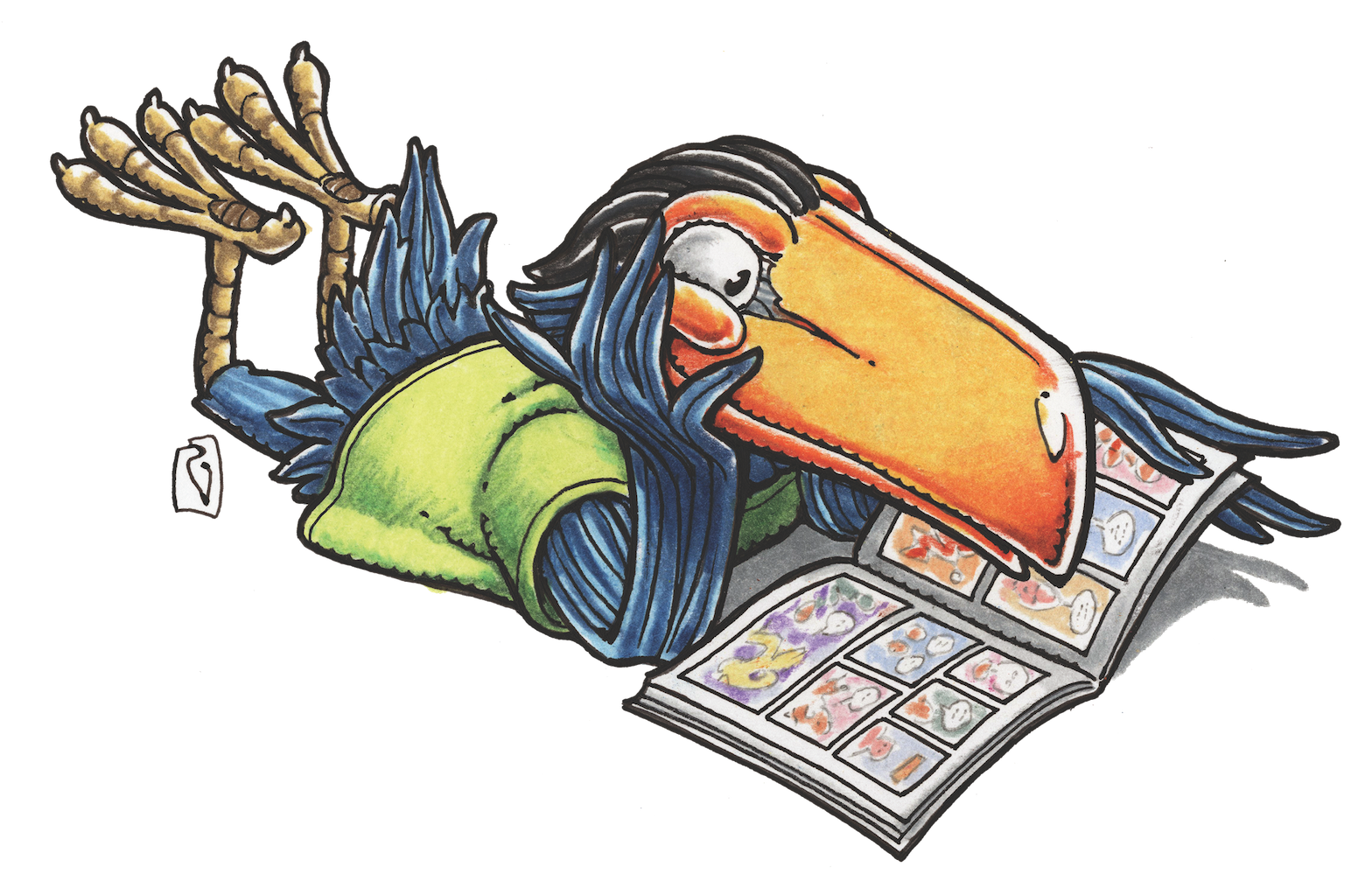STEVE LIEBER’S DILETTANTE
Dilettante 020: The Art of Self-Promotion


There’s been a lot of chatter online the last week or so about an artist who is having trouble finding an audience for his work, and the extent to which not thinking like a businessman contributed to the problem. The conversations took place mostly on social media platforms better suited for snark and hurt feelings than thoughtful discussion, so there was naturally a lot more heat generated than light. That specific situation seems to have settled down, but it made me want to weigh in with some thoughts about the importance of self-promotion for people making comics.
Simply put, if you aren’t devoting some time and effort into promoting your work, you are sabotaging your career. You still need to do good work. That’s a given. It’s just not enough.
“But what about Blah Blah?” you say. “He never promotes his work and he’s hugely popular.” It’s true. There will always be a few people who are so good or so lucky that their work promotes itself. It’s also true that there will always be wilderness fires started by random lightning strikes, but hoping for spontaneous lightning is a lousy strategy for surviving in the woods.
You need to remember that the comics world will not seek you out. They have no need to. There are already more comics available now than anyone has time to read, even if they do nothing else. There are more comics available FOR FREE than anyone will ever have the time to read. If you want a fighting chance to be noticed in the midst of all that competition, you’re going to need to do some work to make that happen.
There are several tools available to you.
Online Portfolio
Are you trying to sell your services as someone that publishers can hire to make comics? You need an online portfolio. These are free. You don’t have to pay for them. They don’t cost money. WHY DON’T YOU HAVE ONE? Deviant Art. Tumblr. Blogspot. WordPress. Flickr. There are plenty of others, too. Sign up for some of them.
• Try to do so with the name that’s on your published work. If your name is common, it might not be available. If that’s the case, don’t pick a clever, obscure, or fannish name that no one will remember to associate with you. Use a modifier or add your middle name. It’s better to be TheJaneSmith or JaneSmithComics than MystyckWyldFyre or BoomerangFan666.
• Every site and platform has its own quirks. Spend an hour or two browsing different websites on the same platform. See how different users organize and present their work. If someone does something smart, note it and see if it could work for you. If they do something annoying, don’t do that.
• Start by uploading your most polished, professional and impressive pages. Show your range as a storyteller. Leave out the unfinished stuff for now, particularly if you are a newcomer. When you’re getting started, it’s far more important to show what you’re capable of than to give people an insight into the minutia of your process. If you absolutely must show unfinished work, segregate it in its own clearly labeled album or folder.
• Make sure your contact info is easy to find. Don’t make potential clients and publishers work to find you. Put a URL on it so that if someone grabs an image from your site, then finds it a month later, they’ll know where it came from. Do this tastefully but legibly.
• Update your site regularly. Demonstrate that you’re still active and steadily producing new work.
• If you have a project underway, make a satisfying sample of it available to potential readers, easily and for free. Don’t make people jump through hoops to get it. No sign-ins, or passwords. And don’t rely on your publisher to build a site for you or host the sample on their own site. Unless your contract explicitly forbids it, do it yourself.
Social Media
Right now, this means Twitter, Tumblr, Facebook, Instagram, Pinterest. Five years from now they might all be irrelevant or gone, and the conversation will have moved somewhere else. That’s fine. Sign up for the ones that are active now, and abandon them when they’re no longer useful.
• Start with whichever ones your friends and/or business contacts are on. Follow them. Look around to see where conversations that interest you are taking place. Find more interesting people to follow. Your favorite authors and artists are on there already. See what they post and who they talk to. Get a feel for how conversations work, then join in. Maybe take note of who irritates you by posting too often, and try to post less than they do.
• Follow people who do the sort of work you do. Follow some bloggers and critics who write about it.
• As I mentioned in the portfolio section, do this under your own professional publishing name, and make it the same name across all the platforms you’re on.
• If you’re using a reblogging platform like Tumblr as a portfolio, I recommend having one that’s just your own work. You can have another Tumblr that’s full of Avengers GIFs and Sherlock quotes. Use that to reblog the work on your portfolio site.
• Don’t be combative or angry, yet. I say this from a from a purely professional perspective: it’s usually much better to walk away from heated discussions, particularly when you’re still getting the lay of the land. There are plenty of things that really are worth getting angry about, but for now you’re trying to incubate your professional career. Put that argument on hold for a little while. I promise you that they’ll still be arguing about it when you come back.
• Don’t just self-promote. It’s called social media. Be sociable! Be smart, funny, insightful. If you’re looking to build a career communicating with words and pictures, it shouldn’t be too big a burden to use those same tools to entertain people via Twitter. The point isn’t to say “buy my work.” The point is to be an interesting person engaging with other people. A happy side effect of this will be that more people will know who you are and what you do.
• If you’re an artist and you have nothing else to say, you can always upload a phone picture of whatever you’re working on at the time. Share what’s in your sketchbook. If you draw a picture of someone else’s character, tag them when you post it. If you impress them, or catch them at the right time, maybe they’ll share it with their audience.
• Make sure your user profile page has links to the other places people can find you and your work.
Conventions
I wrote some tips for artists at conventions a few months ago (click here to read Dilettante 16).
• Use conventions to arrange to meet the people you’ve befriended online. Consider arranging a dinner, or a bar meet-up if no one else seems to have organized one.
• Tell your friends and followers about the cool stuff you see. Post photos. Talk about the best books and most interesting creators you’ve encountered at the con.
• Have a handout that will interest people in your work. Hand it out.
• Have a good sign to help expose passers-by to your name and what your work is like.
• Don’t sit at your table being glum or sour. When you’re at a con, you are a walking, talking 3D ad for your work. If you’re unpleasant in person, people will assume your work is unpleasant too. Working a convention is tough. You might be angry, or tired, or stressing out over money. That’s too bad, but don’t let it show when you’re at your table. They call it “working a convention” for a reason. It’s a job. You don’t have to like being friendly and engaging in this particular context. You just have to do it.
• Follow up with the people you meet. Maintain those connections. Send them an email. Check out their Tumblr. Follow them on Twitter.
None of this will guarantee that you’ll find a sizable readership, or that you’ll get an offer from a publisher. There are no guarantees. Even the best advice can only improve your chances. But comics is a marathon, not a sprint. If you’re serious about doing this for years to come, you’re going to need to find an audience. You should be willing to invest the time and effort it takes to build one.
What self-promotion annoys you, and what do you like? I’m @steve_lieber on Twitter and I’m on Facebook at https://www.facebook.com/steve.lieber Let me know what you think!
Steve Lieber’s Dilettante appears the second Tuesday of each month here on Toucan!